Marc Lesser's Blog, page 4
January 16, 2025
Give Up Hope
“Abandoning hope is an affirmation, the beginning of the beginning.”
– Pema Chodron
We are doomed. We don’t seem to be able to find a way to live peacefully on this planet. There is little sign of a serious appetite to solve, or sometimes even acknowledge climate change. And we are testing the limits of how inexperienced, dishonest, and corrupt our world leaders can be.
On a more local and personal level, Zen teacher Shunryu Suzuki describes our lives as like pushing our boats off the shore and out to sea, with full knowledge that one day our boats will sink.
At an even more personal level, one of his instructions for meditation practice is that with each exhale we explore the act of giving up our expectations or any hope that there will be another inhale. “Let yourself die with each exhale.” He suggests. If by chance there is another inhale, meet this inhale with an attitude of surprise and amazement — ”Oh, I’m alive.”
There is a curious power and an opportunity for radical well being and acceptance in these practices. Giving up hope can shift our state of mind from expecting a particular outcome to being more open or even amazed at what we might discover, right in front of us.
Another Zen teacher Pema Chodron says “Abandoning hope is an affirmation, the beginning of the beginning.”
Giving up hope is an act of courage and affirmation. It is a way of curtailing our subtle and not so subtle sense of predicting dread, of doom, of catastrophizing, of worrying about the future, of living with low level (or high level) of stress about an uncertain future. It’s too late. Stop worrying and instead, be present, here, aware, and alert.
Practice
I’ve been reading Extraordinary Putting (stay with me here…) by Fred Shoemaker. He observes the freedom and fluidity of golfers putting strokes when they are practicing their stroke, with no ball. Then put a ball down, and hope and expectations emerge. The stroke changes, a little or a lot — for the worse. It is not as smooth or steady. In fact, the hope of hitting the ball in a certain way, the expectation of a “good” putt and the fear of a “bad” putt results in a lack of ease and presence. The book is filled with exercises to show how we tighten and distract ourselves, and provides practices for being more present for what we are actually doing – seeing the ball, hitting the ball, with greater awareness and presence, with more ease effectiveness.
Being aware and present for the act of putting is aligned with what Shunryu Suzuki is doing in meditation instructions. Easy to say, and not so easy to practice – be here now, no other place and no other time. It takes practice.
Try this meditation practice. Here. Breathing in, I know that I’m breathing in. Breathing out, I know that I’m breathing out. Let go of hope and expectations.
Keep The Faith
Hope can mean many things, as can faith. While the suggested practice here is giving up hope, don’t give up faith — faith in your heart, in your goodness, and in the goodness of the heart and hearts of the world, of truth over lies, of right over wrong.
As in the Buddhist vows: Delusions are inexhaustible, I vow to end them.
Do keep the faith, your faith.

Executive Coaching – Two openings
My day job is working with CEO’s and business leaders as an executive coach. I also do leadership trainings and facilitate offsite meetings and retreats. My coaching practice focuses on:
Cultivating more clarity, wholeheartedness, and effectivenessCommunication skills, mindfulness-based emotional intelligence, and team buildingRadical well being and decision-makingIf you are interested in exploring a coaching relationship, or know someone who is, you can reach out here or directly at marc@marclesser.net. I currently have two openings.
What I’m Watching
Pachinko – I just began watching this Apple TV show and am amazed by the creativity and heart. It focuses on a Korean family’s struggles and resilience through love, identity, and survival across decades, from Japanese-occupied Korea to modern Japan. The series explores themes of cultural displacement, and the pursuit of belonging amidst historical upheaval.
What I’m Reading
Vegetarian Cooking For Everyone, by Deborah Madison – This is my go-to book for most of my cooking these days. Beautifully designed and inspiring.
A Poem
When I am Among the Trees, by Mary Oliver
When I am among the trees,
especially the willows and the honey locust,
equally the beech, the oaks and the pines,
they give off such hints of gladness.
I would almost say that they save me, and daily.
I am so distant from the hope of myself,
in which I have goodness, and discernment,
and never hurry through the world
but walk slowly, and bow often.
Around me the trees stir in their leaves
and call out, “Stay awhile.”
The light flows from their branches.
And they call again, “It’s simple,” they say,
“and you too have come
into the world to do this, to go easy, to be filled
with light, and to shine.
Half Day Meditation, Sunday February 2nd
From 9:00 a.m. – 12:30, sitting, walking, a short talk, and discussion.
In person, Mill Valley and Online.
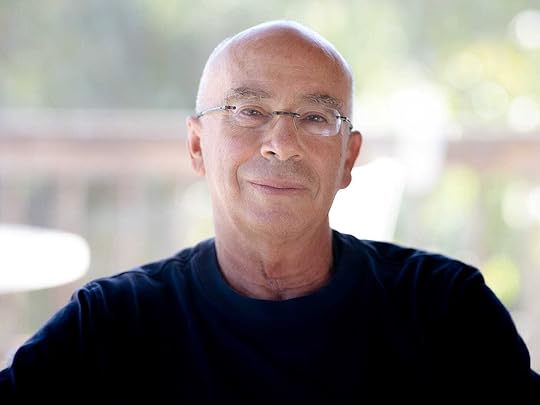
Warmest regards,
Marc
The post Give Up Hope appeared first on Marc Lesser.
January 5, 2025
Living With Ease In a Crazy World
This Time Get It Right
Insights Into PracticesWhat I’m Reading3-Month Practice Period – Starting January 8th (This week.)A Poem: HafizI just returned from Tassajara Zen Mountain Center where I was co-leading a retreat for wild land firefighters. Witnessing their openness, strength, and willingness to practice with heart and depth was inspiring. It reinforced the importance of providing support for those who protect our lands and communities.
It feels a bit strange to return to life outside of the intensity of being with firefighters and for the calendar to say that it is 2025. I sometimes describe one portion of my life as putting things on my calendar. When I first write them on my calendar, they represent the future.
Yet I’ve noticed that at some point these events happen. While they are happening, I call them “now.” For a brief moment, the events become the present. How strange. How interesting. When things are happening, it’s now. Now. Now. Now.
Then afterward, all the trainings, meetings, travel, celebrations, dinners, birthdays, weddings, memorials, whatever—they move from the future, like a bubble bursting, things slip away, that particular now ends, and it’s another moment another day, another now. How strange. Then, something happens, and I refer to these events as the past.
What isn’t on my calendar? Everything that happens around and in between these events. Every surprise and all of life’s endless transitions—growing up and growing older, getting married, having children, starting companies, leaving companies, losses, and deaths. And feelings. So many feelings: joy, grief, loneliness, boredom, love.
Practices
During the Tassajara Firefighter Retreat we were working with the practice of slogans – as ways to remember to be present, open, and connected – right in the midst of the challenges and busyness of our lives. Two of my favorite slogans are:
1) Living With Ease In a Crazy World
The world feels particularly crazy after being at Tassajara for a week, with no news from the outside world. I’m appreciating the moments of quiet, and some time of letting go of accomplishing anything.
Explore finding ease by stepping outside of our crazy world, and experiment with some ease and equanimity right in the midst of the storm. I’m reminded of a Brush Dance greeting card I published many years ago: “Freedom isn’t absence from the storm, but peace within the storm.”
2) This Time Get It Right
This is the practice of intention and aspiration, to learn from past mistakes, to adjust and try something different. I think this slogan is meant to be humorous. It was always “right” after all. And, this time will be different…
Both of these practices seem useful and important as a New Year unfolds. I believe that it was Einstein who said that past, present, and future don’t actually exist but are a “stubbornly persistent illusion.”
What I”m Reading
The Essential Enneagram by David Daniels and Virginia Price – An accessible guide to the Enneagram, a powerful personality system that identifies nine distinct types. It offers practical tools for self-discovery, growth, and healthy relationships.
Appreciating Your Life: A 3-Month Zen Practice Period : Begins this week.
January 8th – April 2nd, 2025
Online
A 3-month Practice Period is a great way to begin or deepen your mindfulness and meditation practice and cultivate ways for integrating mindfulness practice with your work and all parts of your life.
Online meetings are Wednesdays from 6:00 – 7:30 p.m. PT. We will begin each session with 30 minutes of lightly guided meditation, followed by a short talk, as well as small group and large group discussions.
The theme for the Practice Period is Appreciating Your Life. This is the underlying theme of meditation practice and Zen practice – seeing and feeling everything, the good, bad, ugly, beautiful – as gift and an opportunity to learn, grow, and engage. It’s the practice of feeling deeply, opening our hearts and minds, with a mindset of appreciation, and of being of benefit, through our ability to see more clearly, to accept what is, and work effectively with change and for change.
Our primary reading for the practice period is Branching Streams Flow In The Darkness, Zen Talks on a poem called the Sandokai, or the Harmony of Difference and Equality. This is an excellent primer on the non-dual teaching is Zen practice and how to apply them to your wellbeing, relationships, work, and social and environmental responsibility.
Being part of a community that meets weekly is a powerful way to find more clarity and connection as we begin a New Year. Each week we will meditate together for 30 minutes. Then, I’ll give a short talk, unpacking ideas and practices from Branch Stream Flow In The Darkness. We will have a variety of small group and large group discussions, to practice and deepen the tools and themes discussed. Each week you will leave with an actionable insight, or a practice, and a suggested reading.
Weekly sessions will be recorded and made available in case you miss any sessions or want to revisit them.
I hope you will join me. (Register here.)
A Poem
With that Moon Language, translated by Daniel Ladinsky
Admit something:
Everyone you see, you say to them, “Love me.”
Of course you do not do this out loud, otherwise
Someone would call the cops.
Still, though, think about this, this great pull in us to connect.
Why not become the one who lives with a
Full moon in each eye that is always saying,
With that sweet moon language, what every other eye in
This world is dying to hear?
-Hafiz-
Warmest regards,
Marc
The post Living With Ease In a Crazy World appeared first on Marc Lesser.
December 26, 2024
A Dream Too Big…. Is Just The Right Size
“They say that I’m a dreamer,
But I’m not the only one.”
– John Lennon, Imagine
We swim, live, and act in how we envision our world unfolding.
I remember once teaching a leadership and emotional intelligence workshop to Google engineers and getting a good deal of resistance and push back to “envisioning” as a core emotional intelligence competency. “I thought we were supposed to be present, and now you are teaching being in the future” was a specific complaint.
I understand and appreciate the dilemma. “Right now, in this moment, we can explore our visions for the future” was my response.
A visioning practice that I did with Google engineers was to write for seven minutes with this prompt:
If everything in your life was to go exactly as you want it to, what would your life look like in five years from now. What would you be doing. Who would you be doing it with and where would you be? Be specific. And, you might allow yourself to dream big. Why not? What is there to lose?
As one year comes to an end and another year begins, what are your visions, hopes, and dreams, for next year and beyond?
What matters to you most?
Dreaming big can include the outer world, (accomplishing more), more well being (meditation, exercise, sleep, diet), and it can include cultivating opening our hearts, more connections, expressing our creativity, and bringing more love and generosity into our lives.
Resilience: The Other Side of Envisioning
There are many studies supporting the effectiveness of envisioning a supportive or ideal future. And, there is a good deal of evidence to support the importance of resilience — responding to challenges, difficulties, breakdowns, and events going differently than how we’ve envisioned them. There is no shortage of these.
I aspire to dream big and to practice resilience — to be fully engaged with both practices.
A recent executive coaching client began one of our meetings with this statement:
“I’m going to have a horrendous day.” She had scheduled back-to-back meetings, without much space in-between; no time for lunch, and needed to pick up her young children at the end of the day, make dinner, etc. etc…
“That sounds really challenging.” I said. “And, I could imagine three possible scenarios:
1) Have your horrendous day today. Notice what happens and how it feels.
2) Make some changes in how you schedule your time. Perhaps make some small changes such as scheduling 50 minute meetings to give yourself some space.
3) Explore making some “inner” changes or adjustments. Work with your mindset and approach. Can you meet your challenges, meet each moment with a little more appreciation and curiosity?
Practice:
Try on, “A Dream Too Big Is Just the Right Size” through journaling, planning, expressing what matters most to you.
Do some journal writing, engaging your vision for next year and beyond.
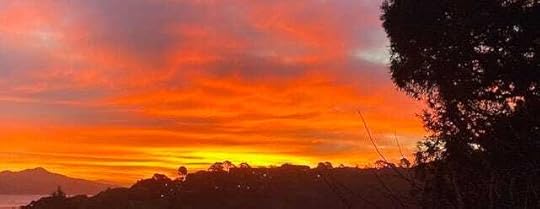
(Sunrise 12/25 from my kitchen table, Christmas/Hanukkah)
A Poem
Basho, a Zen poet from the 17th century wrote:
This dewdrop world –
It may be a dewdrop,
And yet, and yet
A Nursery Rhyme From the 1850’s
Row, row, row your boat
Gently down the stream
Merrily, merrily, merrily, merrily
Live is but a dream
What I’m Watching
100 Years of Solitude. A series based on a novel by Gabriel Garcia Marquez. I’ve just begun watching this and am moved by the interplay of dreams and visions, and the harshness, mystery, and beauty of our lives.
Appreciating Your Life: A 3-Month Zen Practice Period : Begins 2 weeks.
January 8th – April 2nd, 2025
Online
A 3-month Practice Period is a great way to begin or deepen your mindfulness and meditation practice and cultivate ways for integrating mindfulness practice with your work and all parts of your life.
Online meetings are Wednesdays from 6:00 – 7:30 p.m. PT. We will begin each session with 30 minutes of lightly guided meditation, followed by a short talk, as well as small group and large group discussions.
The theme for the Practice Period is Appreciating Your Life. This is the underlying theme of meditation practice and Zen practice – seeing and feeling everything, the good, bad, ugly, beautiful – as gift and an opportunity to learn, grow, and engage. It’s the practice of feeling deeply, opening our hearts and minds, with a mindset of appreciation, and of being of benefit, through our ability to see more clearly, to accept what is, and work effectively with change and for change.
Our primary reading for the practice period is Branching Streams Flow In The Darkness, Zen Talks on a poem called the Sandokai, or the Harmony of Difference and Equality. This is an excellent primer on the non-dual teaching is Zen practice and how to apply them to your wellbeing, relationships, work, and social and environmental responsibility.
Being part of a community that meets weekly is a powerful way to find more clarity and connection as we begin a New Year. Each week we will meditate together for 30 minutes. Then, I’ll give a short talk, unpacking ideas and practices from Branch Stream Flow In The Darkness. We will have a variety of small group and large group discussions, to practice and deepen the tools and themes discussed. Each week you will leave with an actionable insight, or a practice, and a suggested reading.
Weekly sessions will be recorded and made available in case you miss any sessions or want to revisit them.
I hope you will join me. (Register here.)

Merry Christmas, Happy Hanukkah, Happy New Year!
Marc
The post A Dream Too Big…. Is Just The Right Size appeared first on Marc Lesser.
December 20, 2024
The World Is Not What It Seems
Finding Composure Within Our Busy Lives
Insights Into Practices: The World Is Not What It SeemsWhat I’m WatchingA Poem, Tripping Over Joy3-Month Practice Period – Starting January 8thSensory Awareness Workshops In Mexico, February“We practice meditation like someone close to dying. There is nothing to rely on, nothing to depend on. Because you are dying, you don’t want anything, so you cannot be fooled by anything.”
“In meditation we become completely ourselves. We have everything, and we are fully satisfied. There is nothing to attain, so we have a sense of gratitude or joyful mind.”
– Shunryu Suzuki
I’ve always been attracted to, moved, and surprised by the teachings of Shunryu Suzuki. I’ve read Zen Mind, Beginner’s Mind and Not Always So, many times. Somehow, each time I dip back into these short, pithy, deep talks, I’m surprised, literally surprised by what I find.
I’m nearly always left with the question, or challenge, or possibility of — How to live these simple teachings; how to embody them, at work, in relationship, right in the midst of this busy life.
If you’ve read Not Always So you know that the book title comes from a talk where he says, “The secret of Soto Zen is just two words, “Not Always So.”
He pauses, laughs, his audience laughs and he continues: “Oops – three words in English. In Japanese two words. Not Always So. This is the secret of the teaching. It may be so, but it is not always so. Without being caught by words or rules, without too many preconceived ideas, we actually do something.”
Then he continues his talk:
“Real freedom is to not feel limited when wearing this Zen robe, this troublesome formal robe. Similarly in our busy life we should wear this civilization without being bothered by it, without ignoring it, without being caught by it. Without going anywhere, without escaping it, we can find composure in this busy world.
We need to be like a boat person – although carried by the boat, at the same time handling and directing the boat. “That is how we live in this world. Even though you understand how to live in this world like a boatman, that does not mean you are able to do it. It is very difficult which is why you practice zazen.”
Practices
Try on, water is not just water. It can be ice or vapor or home to fish.
When you drink water, just drink water. There is nothing else, nothing to attain.
Let yourself become like water; let yourself become the water.
Allow gratitude and joy to arise.
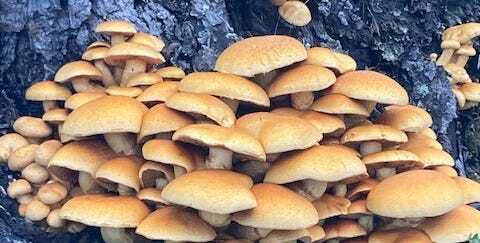
A Poem
TRIPPING OVER JOY, by Hafiz (translated by Daniel Ladinsky)
”What is the difference
Between your experience of Existence
And that of a saint?
The saint knows
That the spiritual path
Is a sublime chess game with God
And that the Beloved
Has just made such a Fantastic Move
That the saint is now continually
Tripping over Joy
And bursting out in Laughter
And saying, “I Surrender!”
Whereas, my dear,
I am afraid you still think
You have a thousand serious moves.”
What I’m Watching
Shrinking – The main character is a grieving therapist. Lots of humor and lots of heart.
Presumed Innocent – A riveting legal thriller with themes of obsession, politics, and the complexities of love.
Appreciating Your Life: A 3-Month Zen Practice Period
January 8th – April 2nd, 2025
Online
A 3-month Practice Period is a great way to begin or deepen your mindfulness and meditation practice and cultivate ways for integrating mindfulness practice with your work and all parts of your life.
Online meetings are Wednesdays from 6:00 – 7:30 p.m. PT. We will begin each session with 30 minutes of lightly guided meditation, followed by a short talk, as well as small group and large group discussions.
The theme for the Practice Period is Appreciating Your Life. This is the underlying theme of meditation practice and Zen practice – seeing and feeling everything, the good, bad, ugly, beautiful – as gift and an opportunity to learn, grow, and engage. It’s the practice of feeling deeply, opening our hearts and minds, with a mindset of appreciation, and of being of benefit, through our ability to see more clearly, to accept what is, and work effectively with change and for change.
Our primary reading for the practice period is Branching Streams Flow In The Darkness, Zen Talks on a poem called the Sandokai, or the Harmony of Difference and Equality. This is an excellent primer on the non-dual teaching is Zen practice and how to apply them to your wellbeing, relationships, work, and social and environmental responsibility.
Being part of a community that meets weekly is a powerful way to find more clarity and connection as we begin a New Year. Each week we will meditate together for 30 minutes. Then, I’ll give a short talk, unpacking ideas and practices from Branch Stream Flow In The Darkness. We will have a variety of small group and large group discussions, to practice and deepen the tools and themes discussed. Each week you will leave with an actionable insight, or a practice, and a suggested reading.
Weekly sessions will be recorded and made available in case you miss any sessions or want to revisit them.
I hope you will join me. (Register here.)
Sensory Awareness Workshops in Mexico, with Lee Klinger Lesser
My wife Lee has been teaching Sensory Awareness, a somatic mindfulness practice. for a lifetime. These workshops are in a small beach town on the coast of Mexico. Great way to explore integrating practice within our complex, busy lives.
February 8 – 15 – In English
February 22 – 28 – In English and Spanish

Warm regards,
Marc
The post The World Is Not What It Seems appeared first on Marc Lesser.
December 12, 2024
If You Learn To Enjoy Waiting, You Don’t Have To Wait To Enjoy
Everything is a mess. Perhaps you’ve noticed.
Not only that but there is too much to do, and not enough time. Too many projects, errands, meetings… It’s hard to ever feel satisfied or rest completely. We are an impatient species.
I know the feeling. Emails to respond to, taking the car to the shop, planning, travel, social media, etc. etc.
The Secret Practice (And it’s not a secret)
I’ve discovered “the secret” is to let it all go. At least for a moment, maybe even this moment. It’s never going to get done. It’s never going to be perfect.
Sometimes, waiting on line or stuck in traffic, I recite a statement “If you learn to enjoy waiting, you don’t have to wait to enjoy” by my good friend, Kaz Tanahashi, a renowned calligrapher and translator. It is a gentle reminder to explore being present and curious, less impatient, and find some humor, and perhaps a touch of joy.
This doesn’t mean I don’t aim for perfection, success, saving (or at least improving) the world. At the same time, the approach and spirit matters a lot.
It’s much like two Shunryu Suzuki statements that I return to again and again.
The first is: “You are perfect just as you are and you can use a little improvement.”
What if you and everything were perfect as is; including the mess, the dramas, the suffering, and everything lacking…all perfect and, at the same time, in need of improvement. The power of this statement is the first part of the statement — the practice of a radical acceptance of what is, right now, in this moment, again and again. From this place, we are more equipped and able to be present, satisfied, and work toward the changes that matter most.
The second statement by Shunryu Suzuki is a bit more obscure but also powerful. This statement was made during the fifth day of a seven-day meditation retreat. He looked out at the group of meditators and could see and feel lots of struggle, challenges, and painful legs and bodies. He began to speak slowly saying: “The pain you are feeling right now….” And in that instant you can imagine those listening filled in the second part of the sentence with something uplifting, perhaps inspiring, at the very least expecting or hoping for some relief. Instead, he continued “The pain you are feeling now, you will feel the rest of your life.”
This is the Zen approach to radical acceptance and welcoming the unwelcome. The Buddha wasn’t kidding when he said that there is no avoiding the unwelcome aspects of being alive.
The message and practice is: Stop resisting, hoping things will be different than they are; stop running away. Instead, explore feeling, being present. Accept that things are just the way they are. From this place, real meeting and real change are more available and more possible.
Practices:
Explore “You are perfect just as you are…” What does this feel like in your body? How might this practice influence your state of mind and your decisions?
Meditation Practice – Try on, even for a few breaths — what does it feel like to be completely satisfied, nothing lacking.
What I’m Reading
Four Thousand Hours: Time Management for Mortals by Oliver Burkeman. Tools and practicing for thinking and acting differently in relation to time and so-called time management. I’m surprised how much I’m enjoying and appreciating this book.
How To Tell A Story, by Meg Bowles, Catherine Burns, Jenifer Hixson, Sarah Austin Jenness, and Kate Tellers – Tools and practices for crafting meaningful and powerful stories. We are all storytellers, like it or not.
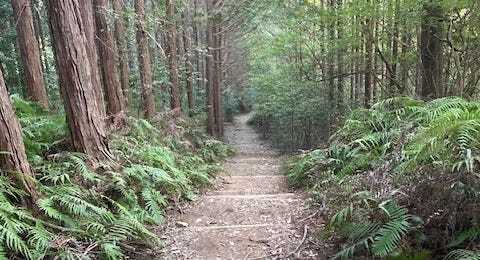
(Walking the Kumano Kodo trail in Japan.)
A Poem (meant to be read slowly….)
Ithaka, By C. P. Cavafy
As you set out for Ithaka
hope your road is a long one,
full of adventure, full of discovery.
Laistrygonians, Cyclops,
angry Poseidon—don’t be afraid of them:
you’ll never find things like that on your way
as long as you keep your thoughts raised high,
as long as a rare excitement
stirs your spirit and your body.
Laistrygonians, Cyclops,
wild Poseidon—you won’t encounter them
unless you bring them along inside your soul,
unless your soul sets them up in front of you.
Hope your road is a long one.
May there be many summer mornings when,
with what pleasure, what joy,
you enter harbors you’re seeing for the first time;
may you stop at Phoenician trading stations
to buy fine things,
mother of pearl and coral, amber and ebony,
sensual perfume of every kind—
as many sensual perfumes as you can;
and may you visit many Egyptian cities
to learn and go on learning from their scholars.
Keep Ithaka always in your mind.
Arriving there is what you’re destined for.
But don’t hurry the journey at all.
Better if it lasts for years,
so you’re old by the time you reach the island,
wealthy with all you’ve gained on the way,
not expecting Ithaka to make you rich.
Ithaka gave you the marvelous journey.
Without her you wouldn’t have set out.
She has nothing left to give you now.
And if you find her poor, Ithaka won’t have fooled you.
Wise as you will have become, so full of experience,
you’ll have understood by then what these Ithakas mean.
Appreciating Your Life: A 3-Month Zen Practice Period
January 8th – April 2nd, 2025
Online
A 3-month Practice Period is a great way to begin or deepen your mindfulness and meditation practice and cultivate ways for integrating mindfulness practice with your work and all parts of your life.
Online meetings are Wednesdays from 6:00 – 7:30 p.m. PT. We will begin each session with 30 minutes of lightly guided meditation, followed by a short talk, as well as small group and large group discussions.
The theme for the Practice Period is Appreciating Your Life. This is the underlying theme of meditation practice and Zen practice – seeing and feeling everything, the good, bad, ugly, beautiful – as gift and an opportunity to learn, grow, and engage. It’s the practice of feeling deeply, opening our hearts and minds, with a mindset of appreciation, and of being of benefit, through our ability to see more clearly, to accept what is, and work effectively with change and for change.
Our primary reading for the practice period is Branching Streams Flow In The Darkness, Zen Talks on a poem called the Sandokai, or the Harmony of Difference and Equality. This is an excellent primer on the non-dual teaching is Zen practice and how to apply them to your wellbeing, relationships, work, and social and environmental responsibility.
Being part of a community that meets weekly is a powerful way to find more clarity and connection as we begin a New Year. Each week we will meditate together for 30 minutes. Then, I’ll give a short talk, unpacking ideas and practices from Branch Stream Flow In The Darkness. We will have a variety of small group and large group discussions, to practice and deepen the tools and themes discussed. Each week you will leave with an actionable insight, or a practice, and a suggested reading.
Weekly sessions will be recorded and made available in case you miss any sessions or want to revisit them.
I hope you will join me.

Warm regards,
Marc
The post If You Learn To Enjoy Waiting, You Don’t Have To Wait To Enjoy appeared first on Marc Lesser.
December 6, 2024
What Surprises Me About My Life Right Now
Insights Into Practices: Surprise
This is one of my favorite writing prompts — What surprises me about my life right now…
Try it, begin with this prompt and write for 3, 7, or 12 minutes. Explore free writing, writing without planning or editing. Let yourself be surprised by what you write. Writing seems to access a different part of our brains/bodies then when we are thinking or speaking. There is a somewhat different flavor of “editor” or our internal editor is open to more possibilities…
The first word that I wrote with this prompt (What surprises me about my life right now…) was “everything.” I’m surprised that it rained this morning, surprised to live near San Francisco, (I grew up in New Jersey), and very surprised to be a Zen teacher/business person. (My father was an electrician; my mother was a secretary). How did that happen?
I imagine the same may be true for you — how did any of this happen, really? And, what will happen next? Surprise is a healthy and creative approach in influencing all parts of our well-being, relationships, and work.
As for surprise and creativity in the work world, I’ve always liked this story:
There was once a US-based recycling company that sent two salesmen to an urban area of southern Spain to assess the market for recycling. After a short time, the company headquarters receives two telegrams:
The first salesman reported:
Situation hopeless. There is no recycling here.
The second salesman reported:
Glorious opportunity. There is no recycling here.
Our minds often crave patterns and predictability. Our brains are constantly making predictions about what will happen next. At the same time, the world is not what it seems. Everything is new, fresh, and perhaps original.
The word original comes from the Latin verb oriri, “to rise” which points to the rising of the moon and the sun; as well as the noun origo, which refers to the rising of a spring from its source in the earth. Though we can predict the patterns of the moon and sun, each moonrise and sunrise are distinct and original. Each spring emerging from its source is fresh, new, and surprising.
When we let go of expectations, of only seeing patterns and predictions, everything is new, fresh, and surprising.
Practice:
Explore writing with the prompt: What surprises me about my life right now….
Notice: What has surprised you thus far, today, this week, this year?
A Poem About Creativity
Robert Bly, Things to Think.
Think in ways you’ve never thought before.
If the phone rings, think of it as carrying a message
Larger than anything you’ve ever heard,
Vaster than a hundred lines of Yeats.
Think that someone may bring a bear to your door,
Maybe wounded and deranged; or think that a moose
Has risen out of the lake, and he’s carrying on his antlers
A child of your own whom you’ve never seen.
When someone knocks on the door, think that he’s about
To give you something large: tell you you’re forgiven,
Or that it’s not necessary to work all the time, or that it’s
Been decided that if you lie down no one will die.
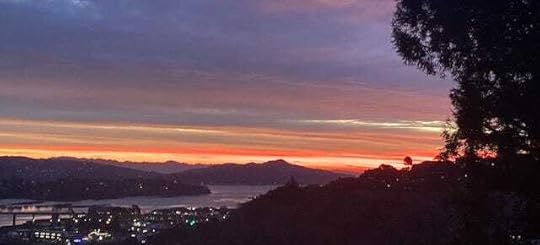
(A surprising sunrise, from my Mill Valley deck this morning.)
What I’m Reading: Creativity
The Creative Act: A Way of Being, by Rick Rubin – Beautifully designed book, and both an extremely poetic and practical approach to living a creative life.
Ten Windows: How Great Poems Transform the Word, by Jane Hirshfield – I love Jane’s poetry and I’m particularly drawn to her prose. Wonderful essays about poetry and the creative process.
Zen Mind, Beginner’s Mind – by Shunryu Suzuki – This is a book I keep reading, again and again. It’s never the same. Beginner’s Mind is a path toward creativity and many other positive aspirations as well.
What I’m Watching: Creativity
McCartney 3,2,1 – Paul McCartney and Rick Rubin explore the creative process, unpacking how many well-known Beatles songs came into being.
Appreciating Your Life: A 3-Month Zen Practice Period
January 8th – April 2nd, 2025
Online
A 3-month Practice Period is a great way to begin or deepen your mindfulness and meditation practice and cultivate ways for integrating mindfulness practice with your work and all parts of your life.
Online meetings are Wednesday from 6:00 – 7:30 p.m. PT. We will begin each session with 30 minutes of lightly guided meditation, followed by a short talk, as well as small group and large group discussions.
The theme for the Practice Period is Appreciating Your Life. This is the underlying theme of meditation practice and Zen practice – seeing and feeling everything, the good, bad, ugly, beautiful – as gift and an opportunity to learn, grow, and engage. It’s the practice of feeling deeply, opening our hearts and minds, with a mindset of appreciation, and of being of benefit, through our ability to see more clearly, to accept what is, and work effectively with change and for change.
Our focus will be on how Zen practice can be integrated into daily life to help us:
– cultivate greater wellbeing
– navigate change and challenges
– discover more meaning and purpose in work and relationship
Our primary reading for the practice period is Branching Streams Flow In The Darkness, Zen Talks on a poem called the Sandokai, or the Harmony of Difference and Equality. This is an excellent primer on the non-dual teaching is Zen practice and how to apply them to your wellbeing, relationships, work, and social and environmental responsibility.
Being part of a community that meets weekly is a powerful way to find more clarity and connection as we begin a New Year. Each week we will meditate together for 30 minutes. Then, I’ll give a short talk, unpacking ideas and practices from Branch Stream Flow In The Darkness. We will have a variety of small group and large group discussions, to practice and deepen the tools and themes discussed. Each week you will leave with an actionable insight, or a practice, and a suggested reading.
Weekly sessions will be recorded and made available in case you miss any sessions or want to revisit them.
I hope you will join me.
Half Day Retreats
December 8th, In Person and Online, in Mill Valley
January 26th, 2025, In Person and Online, in Mill Valley.
In our world of busyness, of more/faster/better, this half-day retreat offers time to stop, reflect, and renew. We will explore the practices of effort and effortless as a path to well-being and “stepping into your life.” Together we’ll follow a gentle schedule of sitting and walking meditation, a talk, and some discussion.
Anyone looking to begin or deepen a meditation and mindfulness practice is invited to attend. What is meditation? I like a definition proposed by Dogen, the 13th century founder of Zen in Japan: “The practice I speak of is not meditation. It is simply the dharma gate of repose and bliss…It is the manifestation of ultimate reality…Once its heart is grasped, you are like a dragon when he gains the water, like a tiger when she enters the mountains.”

Warm regards,
Marc
The post What Surprises Me About My Life Right Now appeared first on Marc Lesser.
November 28, 2024
Good Friends
Today, giving thanks.
It is poignant to return home, especially after two weeks in Japan: teaching a mindful leader workshop in Tokyo, walking the Kumano Kodo sacred trail, and exploring Nara. Here is a photo from a Zen temple in Nara:

Insights Into Practices: Good Friends
In one of the earliest records of a conversation with the historical Buddha, 2,500 years ago, the Buddha was asked:
“What’s the most important practice for a person walking the spiritual path”?
The Buddha replied “Good friends.”
My belief, perhaps bias, is that we are all walking a spiritual path, whether we acknowledge it or not. We all have to contend with the mystery of birth, change, old age, sickness, and death. All relationships and friendships can be challenging: with families, at work, outside of work. And in important ways, all relationships are spiritual in nature. We swim in a sea of relationships, friendships, and hard to define connections.
Interesting and surprising to think of cultivating and embracing good friends as a practice. Our partners, children, siblings, parents, and friends — all have the potential to be good friends. It means expanding and deepening our usual definitions, assumptions, and importance of friends.
Friends have a way of seeing our pains as well as our possibilities. Friends allow us to see ourselves from several perspectives, with both confidence and vulnerability. Good friends widen our worlds and expand our minds and spirits.
Strange how social media “friends” can be obstacles to actual friends. Developing and nurturing friendships takes some intention and some effort and some time.
My experience is that having good friends enriches my life, in many ways. Having good friends is completely worth the intention, effort, and time.
I’ve always been struck by this dialogue with the historical Buddha — naming good friends as the most important practice.
Practice:
Intention: What is your intention regarding cultivating friendships? What is your vision, hope, dream?
Effort: What actions might you take to close the gap between vision and actuality?
Time: What time do you need to make to cultivate friendships?
Poetry
A few lines from a poem by Naomi Shihab Nye called Kindness where she says:
“Before you learn the tender gravity of kindness
you must travel where the Indian in a white poncho
lies dead by the side of the road.
You must see how this could be you,
how he too was someone
who journeyed through the night with plans
and the simple breath that kept him alive.”
My Favorite Quote This Week:
“When you do not realize that you are one with the universe, you have fear.
Our life and death are the same thing.
When we realize this fact we have no fear of death anymore, and we have no actual difficulty in this life.
You will find the true meaning in life….You will discover how meaningless your old interpretation (of life) was, and how much useless effort you had been making.
Your everyday life will be renewed without being attached to an old erroneous interpretation of life.”
– From Zen Mind Beginner’s Mind by Shunryu Suzuki:
What I’m Watching: Two Films
Emilia Perez – a Spanish-language musical film directed by Jacques Audiard. It blends crime, comedy, and musical drama. It tells the story of a Mexican drug lord secretly transitioning into a woman named Emilia Pérez. To start her new life, Emilia fakes her death with the help of a dedicated but wary lawyer. The film explores themes of identity, redemption, and love, highlighting Emilia’s struggles as she distances herself from her family and criminal past. I loved this film. So creative and surprising.
Aftersun – a tender exploration of memory and loss. It follows, an 11-year-old girl, on a summer vacation in the 1990s with her loving but troubled father. I found this film slow, troubling, and beautifully creative and artistic. Not for everyone, but I found it worth staying with it.
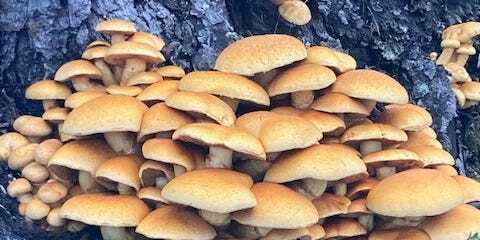
(Some mushrooms near my Mill Valley, CA home)
Appreciating Your Life: A 3-Month Zen Practice Period
January 8th – April 2nd, 2025
Online
A 3-month Practice Period is a great way to begin or deepen your mindfulness and meditation practice and cultivate ways for integrating mindfulness practice with your work and all parts of your life.
Online meetings are Wednesday from 6:00 – 7:30 p.m. PT. We will begin each session with 30 minutes of lightly guided meditation, followed by a short talk, as well as small group and large group discussions.
The theme for the Practice Period is Appreciating Your Life. This is the underlying theme of meditation practice and Zen practice – seeing and feeling everything, the good, bad, ugly, beautiful – as gift and an opportunity to learn, grow, and engage. It’s the practice of feeling deeply, opening our hearts and minds, with a mindset of appreciation, and of being of benefit, through our ability to see more clearly, to accept what is, and work effectively with change and for change.
Our focus will be on how Zen practice can be integrated into daily life to help us:
– cultivate greater wellbeing
– navigate change and challenges
– discover more meaning and purpose in work and relationship
Our primary reading for the practice period is Branching Streams Flow In The Darkness, Zen Talks on a poem called the Sandokai, or the Harmony of Difference and Equality. This is an excellent primer on the non-dual teaching is Zen practice and how to apply them to your wellbeing, relationships, work, and social and environmental responsibility.
Being part of a community that meets weekly is a powerful way to find more clarity and connection as we begin a New Year. Each week we will meditate together for 30 minutes. Then, I’ll give a short talk, unpacking ideas and practices from Branch Stream Flow In The Darkness. We will have a variety of small group and large group discussions, to practice and deepen the tools and themes discussed. Each week you will leave with an actionable insight, or a practice, and a suggested reading.
Weekly sessions will be recorded and made available in case you miss any sessions or want to revisit them.
I hope you will join me.
Half Day Retreats
December 8th, In Person and Online, in Mill Valley
January 26th, 2025, In Person and Online, in Mill Valley.
In our world of busyness, of more/faster/better, this half-day retreat offers time to stop, reflect, and renew. We will explore the practices of effort and effortless as a path to well-being and “stepping into your life.” Together we’ll follow a gentle schedule of sitting and walking meditation, a talk, and some discussion.
Anyone looking to begin or deepen a meditation and mindfulness practice is invited to attend. What is meditation? I like a definition proposed by Dogen, the 13th century founder of Zen in Japan: “The practice I speak of is not meditation. It is simply the dharma gate of repose and bliss…It is the manifestation of ultimate reality…Once its heart is grasped, you are like a dragon when he gains the water, like a tiger when she enters the mountains.”
Warm regards
Marc
The post Good Friends appeared first on Marc Lesser.
November 20, 2024
SCARF and STER: The Acronyms (and Practices) of Suffering and Awakening
Greetings from Japan. Walking four days of the Kumano Kodo trail was wonderful. It was both more challenging and more spectacularly beautiful than I Imagined. Now, enjoying and appreciating a few days in Nara, a former sacred capital.
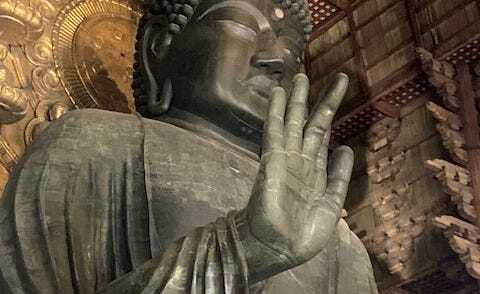
(Fifty foot high wooden Buddha at Todai-ji temple in Nara)
I’m generally not a big fan of acronyms. But, I really like SCARF and STER. Probably because they help me remember 1) how we cause ourselves confusion and suffering and 2) practices for waking up, and living with more emotional freedom.
SCARF stands for
Status
Certainty
Autonomy
Relatedness
Fairness
I call SCARF the acronym of suffering. Gains and losses in each of these areas are often not in our control. What is more in our control is how we interpret and respond to increases and decreases in these areas.
Often leaders (and humans in general) welcome or want more status, more certainty, more autonomy, more healthy relationships, more fairness and we don’t want a decrease in any of these. Neuroscience has shown that an increase in each of these areas lights up in the brain as pleasure and a loss or decrease is associated with the pain centers in our brains.
As an example, we might receive an increase in status with a promotion or a more prominent job title. In response to this increase in status, we feel pleasure. A decrease in status such as a demotion or losing a job signals pain. Status can also be about perceived power or being part of a perceived “in-group” vs. an “out-group.”
One reason we suffer is we may never feel we have enough status and status is both very relative and often not in our control. The same is true for certainty, autonomy, relationships, and fairness — We’ll never get enough certainty. We like having more autonomy and more healthy relationships. Very little in this life is fair. Wanting more (or receiving less) of any of these qualities will lead to confusion and pain.
The SCARF model comes from researcher and author David Rock. It was developed in the context of leadership as a tool, or as a set of management practices for bringing more awareness of the power of these extremely prevalent domains. In leadership we often can give or take away these qualities: status, certainty, autonomy, relationships, and fairness. As leaders there is power in how we wield these five elements or qualities.
SCARF can be used as a model for helping leaders (or anyone) understand how actions and decisions might influence others, or be perceived as rewards or punishments. Through this understanding we can more skillfully navigate change and transitions.
STER: The Acronym of Waking Up
STER stands for:
Selflessness
Timelessness
Effortlessness
Richness
I call STER the acronym of freedom or waking up. It describes states that can free us from what we can’t control. It points to a series of practices to reduce desires and transform a mindset of needs and scarcity to one of greater appreciation.
· Selflessness means becoming more aware of your self and going beyond being caught by the idea of yourself. By looking more deeply, loosening your ego needs and doing some perspective taking, you have more flexibility and a broader perspective.
· Timelessness included the practice stepping back and looking at your life from a much wider perspective in terms of time. Explore what it feels like to let go of time, especially during your morning meditation. Take it slower. Enjoy tasting your food; enjoy being with your family and friends, unrushed. Let go of being driven by the clock.
· Effortlessness starts by noticing and bring more awareness to effort and any extra, unneeded effort and letting it go.
· Richness is seeing and appreciating how alive, new and fresh everything is – your breath, body, the clouds. Look into the eyes of your family member. It is a practice of cultivating more appreciation.
Practice
Notice your own relationship with SCARF: status, certainty, autonomy, relationships, fairness. Bring more awareness to one of these areas. Status is particularly interesting to bring more awareness to.
Practice with STER: selflessness, timelessness, effortlessness, and richness. Play with effort and effortlessness. Practice seeing everything as rich, new, and alive (like everything actually is…)
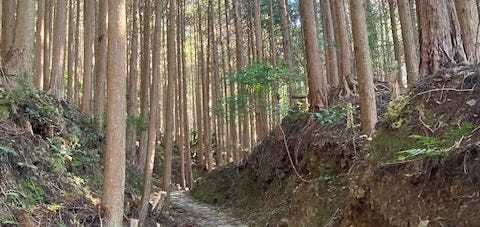
(Kumano Kodo Trail in Japan)
What I’m Cooking: Polenta Casserole
This is an easy and flexible dish, and one of my favorite special dinners to make. It takes a some time, waiting time for the polenta to set — how good to slow down. An alternative is to serve soft, hot polenta with vegetables.
Polenta: Put 1 cup of organic polenta into a saucepan with 3.5 cups of water. Bring to a boil, stirring with a wooden spoon or whisk for 10 minutes. Add a bit of salt. You might add a half cup of cheese, cheddar or gouda, or go wild and try gruyere. (If it is too thick, add some water; if too thin, add a bit more polenta.) Pour into a 8” x 10” baking dish . Let it cool for 15 or 20 minutes and then refrigerate until it sets enough to cut.
Vegetables: 1 onion, small chop, and a few cloves of garlic. Sautee for 10 minutes or so. Add 5 – 8 sliced medium mushrooms and 2 sliced zucchinis. Add a couple of fresh tomatoes or 1 can of fire roasted diced tomatoes. Season with salt and pepper. Maybe 1 chopped serrano salt, pepper, and perhaps some fresh basil
Once the polenta has set, cut into 1 inch squares. Oil a casserole and line the bottom with polenta squares. Put half of the vegetables on top of the polenta, another row of polenta and top with vegetables. One options is to add some cheese to the middle layer and on top.
Cook at 400 for 45 minutes and serve.
Appreciating Your Life: A 3-Month Zen Practice Period
January 8th – April 2nd, 2025
Online
A 3-month Practice Period is a great way to begin or deepen your mindfulness and meditation practice and cultivate ways for integrating mindfulness practice with your work and all parts of your life.
Online meetings are Wednesday from 6:00 – 7:30 p.m. PT. We will begin each session with 30 minutes of lightly guided meditation, followed by a short talk, as well as small group and large group discussions.
The theme for the Practice Period is Appreciating Your Life. This is the underlying theme of meditation practice and Zen practice – seeing and feeling everything, the good, bad, ugly, beautiful – as gift and an opportunity to learn, grow, and engage. It’s the practice of feeling deeply, opening our hearts and minds, with a mindset of appreciation, and of being of benefit, through our ability to see more clearly, to accept what is, and work effectively with change and for change.
Our focus will be on how Zen practice can be integrated into daily life to help us:
– cultivate greater wellbeing
– navigate change and challenges
– discover more meaning and purpose in work and relationship
Our primary reading for the practice period is Branching Streams Flow In The Darkness, Zen Talks on a poem called the Sandokai, or the Harmony of Difference and Equality. This is an excellent primer on the non-dual teaching is Zen practice and how to apply them to your wellbeing, relationships, work, and social and environmental responsibility.
Being part of a community that meets weekly is a powerful way to find more clarity and connection as we begin a New Year. Each week we will meditate together for 30 minutes. Then, I’ll give a short talk, unpacking ideas and practices from Branch Stream Flow In The Darkness. We will have a variety of small group and large group discussions, to practice and deepen the tools and themes discussed. Each week you will leave with an actionable insight, or a practice, and a suggested reading.
Weekly sessions will be recorded and made available in case you miss any sessions or want to revisit them.
I hope you will join me.
Half Day Retreats
December 8th, In Person and Online, in Mill Valley
January 26th, 2025, In Person and Online, in Mill Valley.
In our world of busyness, of more/faster/better, this half-day retreat offers time to stop, reflect, and renew. We will explore the practices of effort and effortless as a path to well-being and “stepping into your life.” Together we’ll follow a gentle schedule of sitting and walking meditation, a talk, and some discussion.
Anyone looking to begin or deepen a meditation and mindfulness practice is invited to attend. What is meditation? I like a definition proposed by Dogen, the 13th century founder of Zen in Japan: “The practice I speak of is not meditation. It is simply the dharma gate of repose and bliss…It is the manifestation of ultimate reality…Once its heart is grasped, you are like a dragon when he gains the water, like a tiger when she enters the mountains.”
Warm regards
Marc
Zen Bones is a reader-supported publication. To receive new posts and support my work, consider becoming a free or paid subscriber.
The post SCARF and STER: The Acronyms (and Practices) of Suffering and Awakening appeared first on Marc Lesser.
November 14, 2024
Go Straight Ahead
Greetings from Japan. I just walked the first day of the Kumano Kodo trail, part of an ancient, sacred walk, in the mountains of the Wakayama peninsula, south of Osaka. Beautiful. Not easy. Worth the effort.
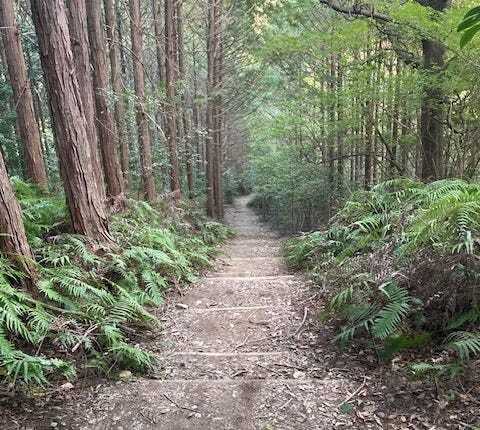
Go Straight Ahead: Insights Into Practices
These are uneasy, challenging times. It’s hard to fathom what will happen with a Trump administration. And, I’m a big believer that the future is impossible to predict. Who would have ever thought Trump would be president, twice? Impossible! And, who would have ever thought Obama would be president? Impossible!
The future is certainly uncertain. What to do? What direction should we take?
Here is a Zen story that (perhaps) provides some direction:
A monk trying to find his way, approaches an older woman on the mountain path and asks, “What is the way to Mt.Tai” She responds, “Go straight ahead.”
A second monk on the path encounters the same woman and asks, “What is the way to Mt Tai?” Again, she responds, “Go straight ahead.”
Later one of these monks told the great Zen teacher Joshu about these incidents.
Joshu said, “Let me go myself and check out this woman.” (Apparently wanting to test her wisdom. And, of course, this being a Zen story, the question of What is the way to Mt. Tai, may actually mean more like, “What direction should I take next in my life, or in this most uncertain life?”)
Joshu approaches the woman and asks, “What is the way to Mt.Tai” She responds, “Go straight ahead.”
Following this encounter, Joshu meets with his assembly of monks and reports, “I have checked out the old woman. She is just fine.”
What’s the point of this story? Without wavering, without foreboding or overthinking, the way forward is “Go straight ahead.” Don’t get sidetracked or swayed by the events of the world. Don’t get emotionally embroiled in trying to predict or fret about the future.
These Zen stories often contain a commentary by the collector of the stories. In this case the commentary to this story says:
“Before the question is asked,
You have already arrived.
Before taking a step
You are already home.”
My commentary on this commentary: The world is not what it seems. Stay close to your heart. Don’t get caught by the events of the world. And go straight ahead, making your best effort to do what is right, taking the most effective actions possible. Perhaps, everything is just as it ought to be.
Practice:
Go Straight Ahead! With courage, strength, and cautious optimism. None of us can predict the future. Explore working with “Go straight ahead” or “Before taking a step, You are already home.”
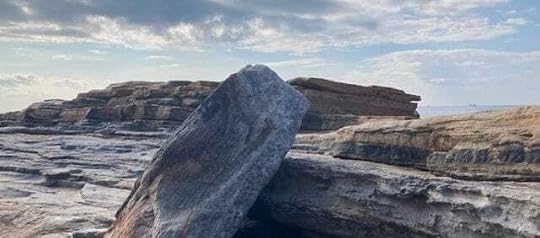
(A volcanic ledge by the ocean in southern Japan.)
What I’m Watching
The Diplomat, Season 2 – Very entertaining. The show blends political intrigue with personal drama, exploring the complexities of global diplomacy, and power struggles. It features intense negotiations, strategic alliances, and the high stakes of foreign policy.
Appreciating Your Life: A 3-Month Zen Practice Period
January 8th – April 2nd, 2025
Online
A 3-month Practice Period is a great way to begin or deepen your mindfulness and meditation practice and cultivate ways for integrating mindfulness practice with your work and all parts of your life.
Online meetings are Wednesday from 6:00 – 7:30 p.m. PT. We will begin each session with 30 minutes of lightly guided meditation, followed by a short talk, as well as small group and large group discussions.
The theme for the Practice Period is Appreciating Your Life. This is the underlying theme of meditation practice and Zen practice – seeing and feeling everything, the good, bad, ugly, beautiful – as gift and an opportunity to learn, grow, and engage. It’s the practice of feeling deeply, opening our hearts and minds, with a mindset of appreciation, and of being of benefit, through our ability to see more clearly, to accept what is, and work effectively with change and for change.
Our focus will be on how Zen practice can be integrated into daily life to help us:
– cultivate greater wellbeing
– navigate change and challenges
– discover more meaning and purpose in work and relationship
Our primary reading for the practice period is Branching Streams Flow In The Darkness, Zen Talks on a poem called the Sandokai, or the Harmony of Difference and Equality. This is an excellent primer on the non-dual teaching is Zen practice and how to apply them to your wellbeing, relationships, work, and social and environmental responsibility.
Being part of a community that meets weekly is a powerful way to find more clarity and connection as we begin a New Year. Each week we will meditate together for 30 minutes. Then, I’ll give a short talk, unpacking ideas and practices from Branch Stream Flow In The Darkness. We will have a variety of small group and large group discussions, to practice and deepen the tools and themes discussed. Each week you will leave with an actionable insight, or a practice, and a suggested reading.
Weekly sessions will be recorded and made available in case you miss any sessions or want to revisit them.
I hope you will join me.
Half Day Retreats
December 8th, In Person and Online, in Mill Valley
January 26th, 2025, In Person and Online, in Mill Valley.
In our world of busyness, of more/faster/better, this half-day retreat offers time to stop, reflect, and renew. We will explore the practices of effort and effortless as a path to well-being and “stepping into your life.” Together we’ll follow a gentle schedule of sitting and walking meditation, a talk, and some discussion.
Anyone looking to begin or deepen a meditation and mindfulness practice is invited to attend. What is meditation? I like a definition proposed by Dogen, the 13th century founder of Zen in Japan: “The practice I speak of is not meditation. It is simply the dharma gate of repose and bliss…It is the manifestation of ultimate reality…Once its heart is grasped, you are like a dragon when he gains the water, like a tiger when she enters the mountains.”

Warm regards,
Marc
The post Go Straight Ahead appeared first on Marc Lesser.
October 31, 2024
Do You Remember? Three Transformative Poems
I keep coming back to this statement by Zen teacher Shunryu Suzuki:
“The purpose of our lives is to cross the shore from confusion to being awake.
The secret is that we cross this shore with every step we take.”
The first part of the statement, describing purpose, feels clear and compelling. It presents a simple, straightforward, and somewhat audacious model or roadmap for this lifetime. It describes an aspiration; to see more clearly, to let go of false beliefs, to drop whatever might be holding us back. This is an aspiration that seems to need regular remembering. It can easily get lost, buried, in the day-to-day activities of our lives.
The second statement, “the secret” may be more challenging. Here is where poetry, and transformation comes in. My first response in reading about “the secret” is “Huh?, What does that mean?” It seems to totally contradict the first statement. It challenges or defies our usual logical mind and understanding.
The “secret” is an expression of Big Mind, or The Absolute, or the non-relative and sacred world. By putting these two statements together, I think that Shunryu Suzuki is asserting that everything is both ordinary and sacred. We have to make an effort to see clearly, and at the same time, however we view or measure our effort or our progress, we are already there – that’s the secret, in plain sight.
Perhaps some poetry might help. It has a way of cutting through our dualistic language, ideas, and models. It’s good for leadership; good for re-discovering purpose, and delving into both purpose and secret.
Practice: Read these poems. Try reading them out loud. Open your mind, heart, and intuition. Write down a few lines and place them somewhere that helps you to remember.
The Word by Tony Hoagland,
Down near the bottom
of the crossed-out list
of things you have to do today,
between “green thread”
and “broccoli” you find
that you have penciled “sunlight.”
Resting on the page, the word
is as beautiful, it touches you
as if you had a friend
and sunlight were a present
he had sent you from some place distant
as this morning — to cheer you up,
and to remind you that,
among your duties, pleasure
is a thing,
that also needs accomplishing
Do you remember?
that time and light are kinds
of love, and love
is no less practical
than a coffee grinder
or a safe spare tire? …..
Two lines that particularly grab my attention in reading this poem:
1) Among your duties, pleasure is a thing…
It’s easy to forget and not prioritize pleasure. The pleasure of a child’s smile, of the taste of a grape, listening to music or laughter.
2) Time and light are kinds of love…
A beautiful expression of Big Mind, seeing that everything, all of the ordinary objects and ideas of everyday life are forms of love.
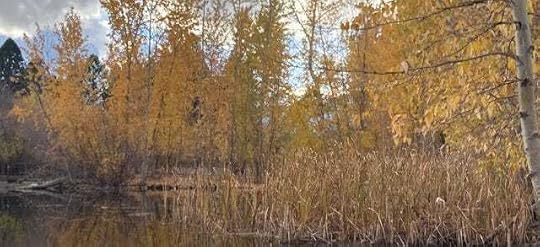
(Fall in Missoula, Montana)
My Life Was the Size of My Life, by Jane Hirshfield
My life was the size of my life.
Its rooms were room-sized,
its soul was the size of a soul.
In its background, mitochondria hummed,
above it sun, clouds, snow,
the transit of stars and planets.
It rode elevators, bullet trains,
various airplanes, a donkey.
It wore socks, shirts, its own ears and nose.
It ate, it slept, it opened
and closed its hands, its windows.
Others, I know, had lives larger.
Others, I know, had lives shorter.
The depth of lives, too, is different.
There were times my life and I made jokes together.
There were times we made bread.
Once, I grew moody and distant.
I told my life I would like some time,
I would like to try seeing others.
In a week, my empty suitcase and I returned.
I was hungry, then, and my life,
my life, too, was hungry, we could not keep
our hands off our clothes on
our tongues from
I love this poem’s conversation, with your life. It’s a way of remembering, from a different perspective. Remembering the daily mundane movements, with reflection and insights. And yet, each word feels like an offering, a way to be surprised, creative, and live with a sense of wonder.
Remind Me, by William Stafford
Remind me again—together we
trace our strange journey, find
each other, come on laughing.
Some time we’ll cross where life
ends. We’ll both look back
as far as forever, that first day.
I’ll touch you—a new world then.
Stars will move a different way.
We’ll both end. We’ll both begin.
Remind me again.
I feel a little strange commenting on any of these poems. This poem as well, by William Stafford, plays with the ordinary and sacred “We’ll look back as far as forever…”
What I’m Reading
There’s a Hair In My Dirt, by Gary Larsen – A children’s book with an important message about our relationship with nature. It’s like a Gary Larsen cartoon expanded into a surprising story.
What I’m Cooking: Ginger Tofu
Simple, easy, and tasty.
Cut a block of tofu into small pieces.
Marinate for a few minutes, or a few hours in some soy sauce, fresh ginger, a bit of olive oil.
A touch of balsamic vinegar if you like.
Nutritional yeast is nice too.
Heat and enjoy.
Of course you can always saute some mushrooms or spinach first, then add the tofu.
Appreciating Your Life: A 3-Month Zen Practice Period
January 8th – April 2nd, 2025
Online
A 3-month Practice Period is a great way to begin or deepen your mindfulness and meditation practice and cultivate ways for integrating mindfulness practice with your work and all parts of your life.
Online meetings are Wednesday from 6:00 – 7:30 p.m. PT. We will begin each session with 30 minutes of lightly guided meditation, followed by a short talk, as well as small group and large group discussions.
The theme for the Practice Period is Appreciating Your Life. This is the underlying theme of meditation practice and Zen practice – seeing and feeling everything, the good, bad, ugly, beautiful – as gift and an opportunity to learn, grow, and engage. It’s the practice of feeling deeply, opening our hearts and minds, with a mindset of appreciation, and of being of benefit, through our ability to see more clearly, to accept what is, and work effectively with change and for change.
Our focus will be on how Zen practice can be integrated into daily life to help us:
– cultivate greater wellbeing
– navigate change and challenges
– discover more meaning and purpose in work and relationship
Our primary reading for the practice period is Branching Streams Flow In The Darkness, Zen Talks on a poem called the Sandokai, or the Harmony of Difference and Equality. This is an excellent primer on the non-dual teachings in Zen practice and how to apply them to your wellbeing, relationships, work, and social and environmental responsibility.
Being part of a community that meets weekly is a powerful way to find more clarity and connection as we begin a New Year. Each week we will meditate together for 30 minutes. Then, I’ll give a short talk, unpacking ideas and practices from Branching Stream Flow In The Darkness. We will have a variety of small group and large group discussions, to practice and deepen the tools and themes discussed. Each week you will leave with an actionable practice and a suggested reading.
Weekly sessions will be recorded and made available in case you miss any sessions or want to revisit them.
Warmest wishes,
Marc

The post Do You Remember? Three Transformative Poems appeared first on Marc Lesser.



